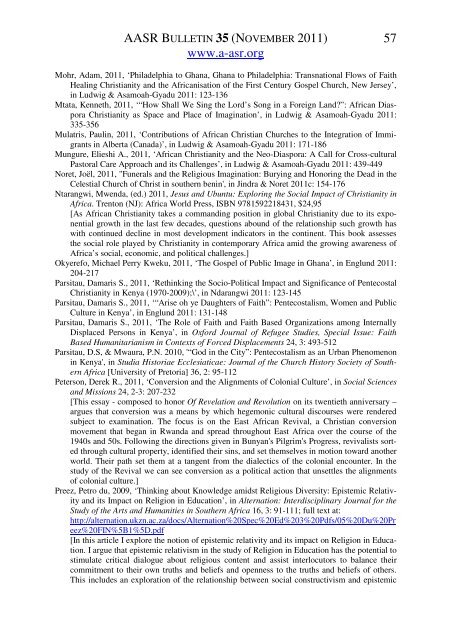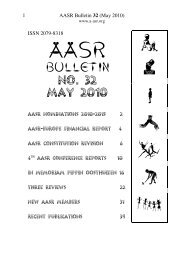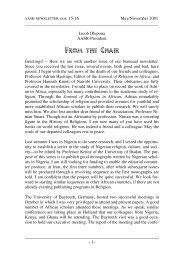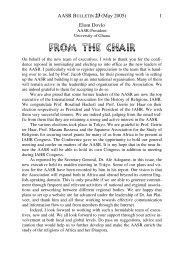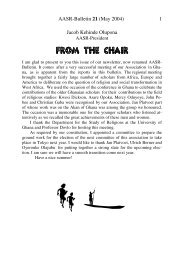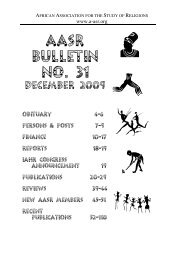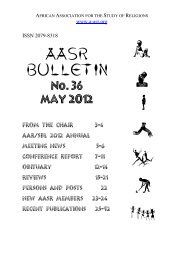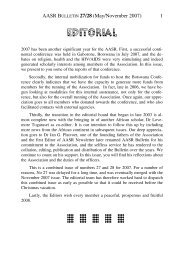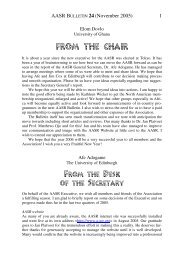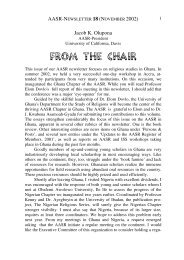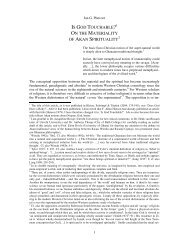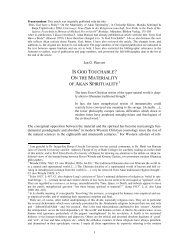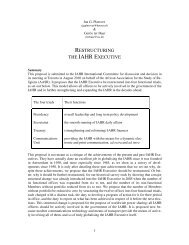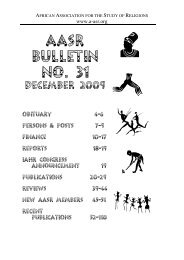AASR Bulletin 35 - The African Association for the Study of Religions
AASR Bulletin 35 - The African Association for the Study of Religions
AASR Bulletin 35 - The African Association for the Study of Religions
You also want an ePaper? Increase the reach of your titles
YUMPU automatically turns print PDFs into web optimized ePapers that Google loves.
<strong>AASR</strong> BULLETIN <strong>35</strong> (NOVEMBER 2011)<br />
www.a-asr.org<br />
57<br />
Mohr, Adam, 2011, ‘Philadelphia to Ghana, Ghana to Philadelphia: Transnational Flows <strong>of</strong> Faith<br />
Healing Christianity and <strong>the</strong> <strong>African</strong>isation <strong>of</strong> <strong>the</strong> First Century Gospel Church, New Jersey’,<br />
in Ludwig & Asamoah-Gyadu 2011: 123-136<br />
Mtata, Kenneth, 2011, ‘“How Shall We Sing <strong>the</strong> Lord’s Song in a Foreign Land”: <strong>African</strong> Diaspora<br />
Christianity as Space and Place <strong>of</strong> Imagination’, in Ludwig & Asamoah-Gyadu 2011:<br />
3<strong>35</strong>-<strong>35</strong>6<br />
Mulatris, Paulin, 2011, ‘Contributions <strong>of</strong> <strong>African</strong> Christian Churches to <strong>the</strong> Integration <strong>of</strong> Immigrants<br />
in Alberta (Canada)’, in Ludwig & Asamoah-Gyadu 2011: 171-186<br />
Mungure, Elieshi A., 2011, ‘<strong>African</strong> Christianity and <strong>the</strong> Neo-Diaspora: A Call <strong>for</strong> Cross-cultural<br />
Pastoral Care Approach and its Challenges’, in Ludwig & Asamoah-Gyadu 2011: 439-449<br />
Noret, Joël, 2011, "Funerals and <strong>the</strong> Religious Imagination: Burying and Honoring <strong>the</strong> Dead in <strong>the</strong><br />
Celestial Church <strong>of</strong> Christ in sou<strong>the</strong>rn benin', in Jindra & Noret 2011c: 154-176<br />
Ntarangwi, Mwenda, (ed.) 2011, Jesus and Ubuntu: Exploring <strong>the</strong> Social Impact <strong>of</strong> Christianity in<br />
Africa. Trenton (NJ): Africa World Press, ISBN 9781592218431, $24,95<br />
[As <strong>African</strong> Christianity takes a commanding position in global Christianity due to its exponential<br />
growth in <strong>the</strong> last few decades, questions abound <strong>of</strong> <strong>the</strong> relationship such growth has<br />
with continued decline in most development indicators in <strong>the</strong> continent. This book assesses<br />
<strong>the</strong> social role played by Christianity in contemporary Africa amid <strong>the</strong> growing awareness <strong>of</strong><br />
Africa’s social, economic, and political challenges.]<br />
Okyerefo, Michael Perry Kweku, 2011, ‘<strong>The</strong> Gospel <strong>of</strong> Public Image in Ghana’, in Englund 2011:<br />
204-217<br />
Parsitau, Damaris S., 2011, ‘Rethinking <strong>the</strong> Socio-Political Impact and Significance <strong>of</strong> Pentecostal<br />
Christianity in Kenya (1970-2009);\’, in Ndarangwi 2011: 123-145<br />
Parsitau, Damaris S., 2011, ‘“Arise oh ye Daughters <strong>of</strong> Faith”: Pentecostalism, Women and Public<br />
Culture in Kenya’, in Englund 2011: 131-148<br />
Parsitau, Damaris S., 2011, ‘<strong>The</strong> Role <strong>of</strong> Faith and Faith Based Organizations among Internally<br />
Displaced Persons in Kenya’, in Ox<strong>for</strong>d Journal <strong>of</strong> Refugee Studies, Special Issue: Faith<br />
Based Humanitarianism in Contexts <strong>of</strong> Forced Displacements 24, 3: 493-512<br />
Parsitau, D.S, & Mwaura, P.N. 2010, '“God in <strong>the</strong> City”: Pentecostalism as an Urban Phenomenon<br />
in Kenya', in Studia Historiae Ecclesiaticae: Journal <strong>of</strong> <strong>the</strong> Church History Society <strong>of</strong> Sou<strong>the</strong>rn<br />
Africa [University <strong>of</strong> Pretoria] 36, 2: 95-112<br />
Peterson, Derek R., 2011, ‘Conversion and <strong>the</strong> Alignments <strong>of</strong> Colonial Culture’, in Social Sciences<br />
and Missions 24, 2-3: 207-232<br />
[This essay - composed to honor Of Revelation and Revolution on its twentieth anniversary –<br />
argues that conversion was a means by which hegemonic cultural discourses were rendered<br />
subject to examination. <strong>The</strong> focus is on <strong>the</strong> East <strong>African</strong> Revival, a Christian conversion<br />
movement that began in Rwanda and spread throughout East Africa over <strong>the</strong> course <strong>of</strong> <strong>the</strong><br />
1940s and 50s. Following <strong>the</strong> directions given in Bunyan's Pilgrim's Progress, revivalists sorted<br />
through cultural property, identified <strong>the</strong>ir sins, and set <strong>the</strong>mselves in motion toward ano<strong>the</strong>r<br />
world. <strong>The</strong>ir path set <strong>the</strong>m at a tangent from <strong>the</strong> dialectics <strong>of</strong> <strong>the</strong> colonial encounter. In <strong>the</strong><br />
study <strong>of</strong> <strong>the</strong> Revival we can see conversion as a political action that unsettles <strong>the</strong> alignments<br />
<strong>of</strong> colonial culture.]<br />
Preez, Petro du, 2009, ‘Thinking about Knowledge amidst Religious Diversity: Epistemic Relativity<br />
and its Impact on Religion in Education’, in Alternation: Interdisciplinary Journal <strong>for</strong> <strong>the</strong><br />
<strong>Study</strong> <strong>of</strong> <strong>the</strong> Arts and Humanities in Sou<strong>the</strong>rn Africa 16, 3: 91-111; full text at:<br />
http://alternation.ukzn.ac.za/docs/Alternation%20Spec%20Ed%203%20Pdfs/05%20Du%20Pr<br />
eez%20FIN%5B1%5D.pdf<br />
[In this article I explore <strong>the</strong> notion <strong>of</strong> epistemic relativity and its impact on Religion in Education.<br />
I argue that epistemic relativism in <strong>the</strong> study <strong>of</strong> Religion in Education has <strong>the</strong> potential to<br />
stimulate critical dialogue about religious content and assist interlocutors to balance <strong>the</strong>ir<br />
commitment to <strong>the</strong>ir own truths and beliefs and openness to <strong>the</strong> truths and beliefs <strong>of</strong> o<strong>the</strong>rs.<br />
This includes an exploration <strong>of</strong> <strong>the</strong> relationship between social constructivism and epistemic


